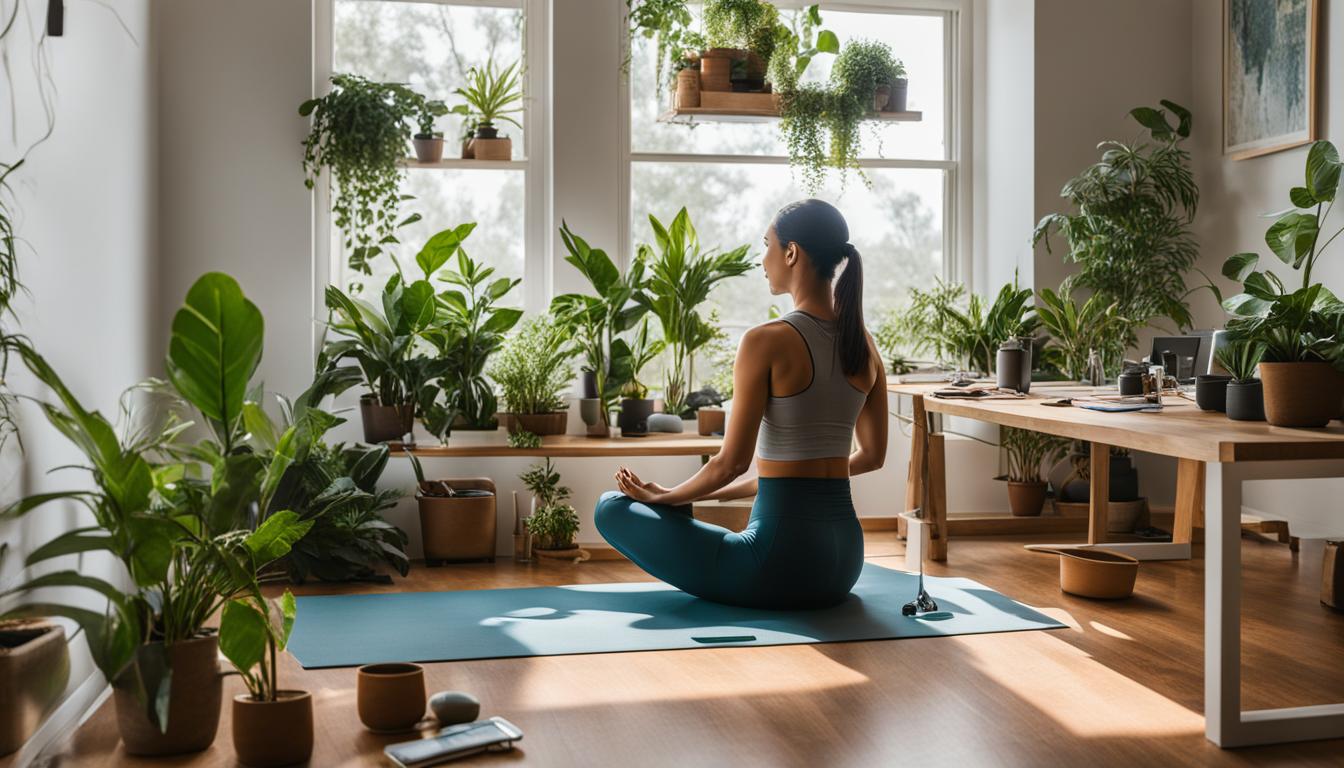DIY Self-Care Routines for Busy Professionals
Taking care of ourselves is often neglected in our busy lives, but it is crucial for maintaining our well-being. In this article, we will explore some DIY self-care routines specifically tailored for busy professionals who struggle to find time for self-care. These routines will help you balance your hectic schedule and prioritize your personal well-being.
Key Takeaways:
- Busy professionals often neglect self-care due to their demanding schedules.
- Self-care is essential for maintaining physical and mental health.
- Engaging in self-care activities at home can reduce stress and improve overall well-being.
- Listening to your body’s cues is crucial in identifying your self-care needs.
- Mindfulness practices can help reduce stress and promote emotional well-being.
The Importance of Self-Care for Busy Professionals
Busy professionals often find themselves consumed by the demands of work and personal commitments, leaving little time for self-care. However, neglecting self-care can have detrimental effects on physical and mental health. It is essential for busy professionals to prioritize self-care in order to maintain overall well-being and achieve a sense of balance.
Engaging in self-care activities at home can be a convenient and effective way for busy professionals to nurture their mental and emotional health. By incorporating self-care practices into their daily routines, professionals can reduce stress, improve focus, and enhance their overall quality of life.
To ensure that self-care becomes an integrated part of their busy lives, professionals can consider the following self-care tips and ideas:
1. Create a Daily Self-Care Ritual
Set aside dedicated time each day for self-care activities that help you relax and recharge. Whether it’s practicing meditation, journaling, or enjoying a hot bath, establishing a daily self-care ritual can significantly improve your well-being.
2. Incorporate Mindfulness into Everyday Tasks
Practice mindfulness during routine activities such as eating, walking, or doing household chores. Pay attention to the present moment, savor the sensations, and let go of unnecessary distractions. Mindfulness helps promote a state of calm and awareness.
3. Engage in Activities That Bring You Joy
Identify activities that bring you joy and make it a priority to engage in them regularly. Whether it’s pursuing a creative hobby, spending time in nature, or connecting with loved ones, finding joy in everyday life is an essential aspect of self-care.
Remember, self-care is not a luxury; it is a necessity in order to maintain your physical, mental, and emotional well-being.
4. Practice Self-Compassion
Be kind and compassionate towards yourself, especially during challenging times. Treat yourself with the same care and understanding that you extend to others. Practice self-compassion by acknowledging your accomplishments, setting realistic expectations, and embracing self-acceptance.
5. Prioritize Rest and Sleep
Ensure that you prioritize getting enough rest and quality sleep each night. Set a consistent bedtime routine, create a peaceful sleep environment, and avoid excessive use of electronic devices before bed. Adequate rest allows your body and mind to recharge and rejuvenate.
6. Cultivate a Supportive Network
Surround yourself with supportive individuals who understand and value the importance of self-care. Build a network of friends, family, and colleagues who can provide encouragement, accountability, and emotional support during challenging times.
By prioritizing self-care at home and integrating simple yet effective practices into their busy routines, professionals can nurture their well-being and lead more fulfilling lives.
| Self-Care Activities | Benefits |
|---|---|
| Engaging in physical exercise | Improves cardiovascular health, boosts mood, and reduces stress levels. |
| Practicing meditation or deep breathing exercises | Reduces anxiety, promotes relaxation, and increases self-awareness. |
| Journaling or expressing thoughts and emotions through writing | Enhances self-reflection, reduces stress, and improves emotional well-being. |
| Engaging in hobbies or creative outlets | Provides a source of joy, fosters self-expression, and promotes a sense of fulfillment. |
| Setting boundaries and saying no when necessary | Reduces overwhelm, decreases stress levels, and preserves energy for self-care. |
Listening to Your Body’s Cues
Our bodies are incredible at communicating with us, often sending signals when we are in need of self-care. It is essential to listen to these cues and take action to maintain our overall well-being. By paying attention to these signs, we can better understand our needs and implement effective self-care practices and strategies.
There are several common signals that indicate the need for self-care:
- Trouble sleeping: Difficulty falling asleep, staying asleep, or experiencing restless nights may be a sign that your body and mind require rest and relaxation.
- Fatigue: Feeling constantly tired or lacking energy can be a sign that you need to recharge and prioritize self-care.
- Changes in appetite: Noticeable changes in your appetite, such as sudden cravings or loss of interest in food, can indicate the need for self-care and attention to your nutritional needs.
- Difficulty focusing: Struggling to concentrate, experiencing brain fog, or having trouble staying on task may be a signal that your mind needs a break and some mental rejuvenation.
- Irritability: Feeling easily agitated, irritable, or having a shorter fuse than usual can be a sign of emotional exhaustion and a lack of self-care practices.
- Increased substance use: Turning to substances such as alcohol, drugs, or excessive caffeine to cope with stress or emotional strain may indicate the need for healthier self-care habits.
- Changes in social behavior: Withdrawing from social activities, isolating yourself, or feeling a lack of connection with others may signal the need for self-care and nurturing relationships.
By recognizing these cues, you can take proactive steps towards implementing effective self-care practices. The following self-care techniques and habits can help you address these signals and improve your overall well-being:
- Establish a consistent self-care routine that includes activities you enjoy and find rejuvenating.
- Practice stress management techniques, such as deep breathing exercises, meditation, or yoga.
- Engage in regular physical activity or exercise to boost your energy levels and reduce stress.
- Take breaks throughout the day to rest, relax, and recharge.
- Prioritize sleep and create a soothing bedtime routine to ensure quality rest.
- Connect with loved ones and build a support system for emotional well-being.
- Practice mindfulness and be present in the moment to reduce stress and enhance self-awareness.
- Set healthy boundaries and learn to say no when necessary to avoid burnout.
- Engage in activities that bring you joy, whether it’s pursuing hobbies, listening to music, or spending time in nature.
By incorporating these self-care strategies into your daily life, you can effectively address the cues your body sends and improve your overall well-being.
Incorporating Mindfulness into Your Routine
Mindfulness is a powerful tool for self-care. It helps reduce stress, increase self-awareness, improve focus, and promote emotional well-being. By dedicating just 10 minutes in the morning to mindfulness practices such as meditation or deep breathing, busy professionals can reap the benefits of increased self-awareness and improved mental health.
When practicing mindfulness at home, creating a calming environment is crucial. Find a quiet space where you can focus without distractions. Consider using soft lighting, comfortable cushions or a meditation chair, and soothing scents like lavender or sandalwood to enhance your mindfulness experience.

Begin your mindfulness practice by sitting in a comfortable position and closing your eyes. Take a few deep breaths, focusing on the sensation of the breath entering and leaving your body. Allow your thoughts to come and go without judgment, gently bringing your attention back to your breath whenever your mind wanders.
To further enhance your mindfulness practice, you can incorporate mindful movement into your routine. This can be as simple as going for a mindful walk in nature, fully experiencing the sights, sounds, and sensations of your surroundings. Other options include practicing yoga or tai chi, which not only promote mindfulness but also offer physical benefits.
Remember, mindfulness is about being fully present in the moment, cultivating awareness of your thoughts, emotions, and physical sensations. It’s a practice that can be integrated into various aspects of your daily routine to promote overall well-being.
Practical Tips for Integrating Mindfulness into Your Daily Routine
| Tip | Description |
|---|---|
| Start Small | Begin with just a few minutes of mindfulness practice each day and gradually increase the duration as it becomes more comfortable. |
| Set Reminders | Use phone reminders or calendar notifications to prompt you to take a moment for mindfulness throughout the day. |
| Integrate Mindfulness into Daily Activities | Practice mindfulness while engaging in everyday tasks such as eating, walking, or showering. Focus on the sensations and experience of each moment. |
| Utilize Mindfulness Apps | Download mindfulness apps that provide guided meditations or mindfulness exercises to support your daily practice. |
| Join Mindfulness Communities | Consider joining local or online mindfulness communities to connect with like-minded individuals and gain support on your mindfulness journey. |
Incorporating mindfulness into your routine can have a transformative impact on your well-being. By practicing mindfulness regularly, you can cultivate a greater sense of calm, clarity, and inner peace, helping you navigate the challenges of a busy professional life with more resilience and ease.
Investing in Professional Support
Sometimes, self-care requires professional support. Therapy, in particular, can be a valuable tool for busy professionals to prioritize their mental health and build resilience. Engaging in therapy sessions can help individuals identify patterns, manage stress, and gain valuable insight into their thoughts and behaviors. Working with a qualified therapist can provide the necessary guidance and tools to navigate the challenges of daily life while prioritizing self-care for mental health.
Additionally, other forms of professional support, such as personal trainers, dietitians, or coaches, can contribute to a holistic self-care routine. These experts can provide tailored guidance and support in areas such as physical fitness, nutrition, and personal development. By incorporating professional support into their self-care practices at home, busy professionals can enhance their well-being and achieve a healthier work-life balance.
Investing in professional support is an important aspect of self-care as it allows individuals to access specialized knowledge and expertise. It offers an opportunity to receive personalized guidance and develop strategies that align with their unique needs and goals.
“Therapy is not a place to be judged; it’s a place to heal.”
– Michelle Obama
Benefits of Professional Support:
| Professional Support | Benefits |
|---|---|
| Therapy | Identify patterns, manage stress, gain insight |
| Personal Training | Tailored fitness guidance, motivation |
| Dietitian | Nutrition advice, meal planning support |
| Coaching | Personal development strategies, goal setting |
By seeking professional help and considering different forms of support, busy professionals can enhance their self-care practices and achieve optimal well-being.
Making Time for Exercise
Regular exercise is a crucial component of self-care for busy professionals. Despite hectic schedules, it is important to prioritize physical activity for both the body and mind. By treating 2-3 workouts a week as non-negotiable appointments, like work meetings, professionals can make exercise an integral part of their routines.
Creating a schedule and sticking to it is key to incorporating exercise into a busy lifestyle. By blocking out specific time slots for workouts and treating them with the same importance as other commitments, professionals can ensure they make time for their self-care.
“Exercise is a vital part of my self-care routine. It helps me release stress, clear my mind, and recharge my energy. I treat my exercise time as a non-negotiable priority and plan my schedule accordingly.” – Sarah Thompson, Marketing Executive
When it comes to selecting exercises, it’s essential to choose activities that are enjoyable and easily adaptable to a busy lifestyle. Quick and efficient workouts, such as HIIT (High-Intensity Interval Training) or Circuit Training, are great options for busy professionals. These workouts provide maximum benefits in a short amount of time, making them ideal for those with limited schedules.

Additionally, incorporating physical movement throughout the day can also be beneficial. Taking short breaks to stretch, going for a walk during lunchtime, or using standing desks are simple ways to add more movement to an otherwise sedentary workday. Remember, every little bit counts when it comes to taking care of your body and improving your overall well-being.
Benefits of making time for exercise:
| Physical Benefits | Mental Benefits |
|---|---|
| Improves cardiovascular health | Reduces stress and anxiety |
| Increases strength and flexibility | Boosts mood and overall well-being |
| Helps maintain a healthy weight | Enhances cognitive function and focus |
| Reduces the risk of chronic diseases | Promotes better sleep quality |
By making self-care a priority and scheduling regular exercise, busy professionals can experience the numerous benefits it offers. Remember, taking care of yourself is essential for overall health and well-being.
Nourishing Your Body with Healthy Meals
Eating well is an essential aspect of self-care. As a busy professional, finding time to prepare nutritious meals can be challenging. However, by incorporating a self-care routine planner and dedicating a few hours at the beginning of the week to meal prep, you can ensure that you have healthy and delicious meals ready to go. This not only saves you time but also helps you resist the temptation of resorting to unhealthy options when hunger strikes.
Meal prep is a homemade self-care practice that allows you to take control of your diet and prioritize your well-being. By planning and preparing your meals in advance, you can make sure that you’re fueling your body with wholesome ingredients that support your overall health. Here are some meal prep ideas to get you started:
| Meal | Ingredients | Preparation Time |
|---|---|---|
| Quinoa Salad | Quinoa, mixed vegetables, feta cheese, lemon dressing | 30 minutes |
| Chicken Stir-Fry | Chicken breast, colorful bell peppers, broccoli, soy sauce, brown rice | 45 minutes |
| Veggie Wrap | Whole wheat tortilla, hummus, spinach, cucumber, bell peppers | 20 minutes |
| Salmon with Roasted Vegetables | Fresh salmon fillet, Brussels sprouts, sweet potatoes, olive oil, lemon | 40 minutes |
By dedicating a few hours each week to meal prep, you can save time and ensure that you’re nourishing your body with nutrient-dense meals. This self-care routine at home allows you to stay on track with your health goals and provides the energy you need to tackle your busy schedule. Plus, the satisfaction of enjoying a delicious and homemade meal can bring a sense of fulfillment and well-being.
Remember, homemade self-care practices like meal prep are an investment in your overall wellness. By prioritizing your nutrition, you’re taking proactive steps to support your physical and mental health. So grab your self-care routine planner and start creating a meal prep schedule that works for you. Your body will thank you for it!

“Taking care of your body through nourishing meals is an act of self-love and self-care.” – Unknown
Finding Joy in Everyday Life
Self-care is not just about meeting basic needs; it is also about finding joy and fulfillment in everyday life. As a busy professional, it can be easy to get caught up in the hectic pace of work and neglect the activities that bring us happiness. However, incorporating self-care practices that bring joy into our routine is essential for maintaining overall well-being.
One way to find joy in everyday life is by engaging in a hobby. Whether it’s painting, playing a musical instrument, or gardening, spending time doing something we love can bring a sense of fulfillment and relaxation. By setting aside dedicated time for our hobbies, we can recharge our energy and reconnect with our passions.
Spending quality time with loved ones is another important aspect of finding joy. Amidst our busy schedules, it’s crucial to make time for our family and friends. Whether it’s a weekly dinner with loved ones or a weekend outing, these moments of connection can bring immense joy and strengthen our relationships.
Engaging in creative outlets is also a great way to find joy in everyday life. It could be writing in a journal, photography, or even cooking a new recipe. Allowing ourselves to express our creativity can bring a sense of accomplishment and rejuvenation.
Incorporating joyful activities into a busy schedule may seem challenging, but it is possible with a little planning. Prioritizing and scheduling time for self-care activities that bring us joy can enhance our overall well-being and provide a much-needed break from our daily responsibilities.
“The true joy of self-care lies in finding the activities that ignite your passion and bring a smile to your face. Embrace these moments and cherish the happiness they bring.” – Unknown
Practical Suggestions for Incorporating Joyful Activities
| Activity | Time Commitment |
|---|---|
| Morning Walk | 30 minutes |
| Painting or Drawing | 1 hour |
| Cooking a New Recipe | 2 hours |
| Family Game Night | 2 hours |
| Reading a Book | 30 minutes |
Remember, self-care is not a luxury; it is a necessity for our overall well-being. By finding joy in everyday life and incorporating self-care practices that bring us happiness, we can lead a more balanced and fulfilling lifestyle.
Reflecting on Your Self-Care Journey
Self-care is not a one-size-fits-all approach. It’s a personal journey that requires self-reflection and introspection. By taking the time to reflect on your self-care practice, you can unlock the full potential of its benefits for your mental health and overall well-being.
Here are some key questions to guide your self-reflection:
1. What does self-care mean to you?
Define what self-care means in your life. Is it about pampering yourself, setting boundaries, or practicing mindfulness? Understanding your personal definition will help you align your self-care practice with your core values and needs.
2. What activities bring you peace of mind?
Identify the activities that bring you a sense of calm and tranquility. Whether it’s taking a walk in nature, journaling, or practicing yoga, these activities can be integrated into your self-care routine to promote mental and emotional well-being.
3. What activities bring you joy?
Identify the activities that bring you joy and uplift your mood. It could be pursuing a hobby, spending time with loved ones, or engaging in creative outlets. Incorporating these joyful activities into your self-care routine will help you find balance and fulfillment in your daily life.
4. What activities help you feel recharged?
Reflect on the activities that recharge your energy and rejuvenate your mind. It could be getting enough sleep, practicing relaxation techniques, or simply taking a break from work. Prioritizing these activities in your self-care routine will ensure you have the energy to tackle challenges and navigate daily stressors.
By answering these self-reflection questions, you can gain valuable insights into your self-care needs and preferences. Use this self-awareness to guide your self-care routine and make adjustments as needed. Remember, self-care is a continuous journey of self-discovery and self-improvement.
| Keyword | Definition |
|---|---|
| Self-care benefits | The positive outcomes and advantages of practicing self-care, such as improved well-being and reduced stress. |
| Self-care practice | The act of engaging in activities and behaviors that promote self-care and well-being. |
| Self-care routine for mental health | A structured set of activities and practices designed to support and improve mental health through self-care. |
| Self-care ideas for stress relief | Suggestions and inspirations for self-care activities aimed at alleviating stress and promoting relaxation. |
| Self-care routine guide | An informative guide or resource that provides instructions and recommendations for developing and maintaining a self-care routine. |
Conclusion
In conclusion, DIY self-care routines are essential for busy professionals to prioritize their personal well-being. By incorporating self-care practices into their daily lives, professionals can reduce stress, improve mental health, and lead a more balanced and fulfilling lifestyle.
It is crucial to listen to your body’s cues and address them promptly. Pay attention to signs such as trouble sleeping, fatigue, changes in appetite, difficulty focusing, irritability, increased substance use, and changes in social behavior. Understanding and addressing these cues will help you implement self-care practices and improve your overall wellness.
Investing in professional support is also important. Seeking therapy and other forms of professional assistance can provide valuable guidance and insight into managing stress, building resilience, and maintaining mental health. Additionally, making time for exercise, nourishing your body with healthy meals, finding joy in everyday life, and reflecting on your self-care journey are all crucial elements of a comprehensive self-care routine.
Remember, self-care is not selfish; it is necessary for living a happy and fulfilling life. Prioritize your well-being and make self-care a priority in your busy schedule. By taking care of yourself, you will be better equipped to handle the demands of your professional and personal life, leading to a more enjoyable and balanced lifestyle.
FAQ
What are DIY self-care routines?
DIY self-care routines are self-care practices that you can do at home without the need for professional assistance or guidance. These routines are tailored to busy professionals who struggle to find time for self-care.
Why is self-care important for busy professionals?
Self-care is crucial for maintaining physical and mental health. Engaging in self-care activities can help reduce stress, improve focus, and boost overall well-being, allowing busy professionals to better balance their hectic schedules and prioritize their personal well-being.
How can I listen to my body’s cues for self-care?
Your body sends signals when it is in need of self-care. Signs that indicate the need for self-care include trouble sleeping, fatigue, changes in appetite, difficulty focusing, irritability, increased substance use, and changes in social behavior. By being aware of these cues, you can better understand your needs and implement self-care practices to improve your overall wellness.
How can I incorporate mindfulness into my busy routine?
Mindfulness is a powerful tool for self-care. Dedicate just 10 minutes in the morning to mindfulness practices such as meditation or deep breathing. These practices can help reduce stress, increase self-awareness, improve focus, and promote emotional well-being.
When should I consider seeking professional support for self-care?
Sometimes, self-care requires professional support. Therapy can be a valuable tool for navigating mental health and building resilience. Additionally, other forms of professional support, such as personal trainers, dietitians, or coaches, can contribute to a holistic self-care routine.
How can I make time for exercise as a busy professional?
It is important to prioritize exercise for physical and mental well-being. Treat 2-3 workouts a week as work meetings and schedule them in advance. By incorporating exercise into your routine, you can enjoy the numerous benefits it offers for stress relief and overall well-being.
How can I nourish my body with healthy meals despite a busy schedule?
Busy professionals can save time and money by preparing healthy meals in advance. Dedicate a few hours at the beginning of the week for meal prep. This ensures you have nutritious meals ready to go, reducing the temptation to resort to unhealthy options.
Why is finding joy in everyday life important for self-care?
Self-care is not just about meeting basic needs; it is also about finding joy and fulfillment in everyday life. Incorporate self-care practices that bring you joy, whether it’s engaging in a hobby, spending time with loved ones, or pursuing creative outlets.
How can self-reflection enhance my self-care routine?
Self-reflection is a valuable tool for improving and refining your self-care routine. By asking yourself key questions about what self-care means to you and what brings you joy or peace of mind, you can gain insight into your self-care needs and make adjustments accordingly.

